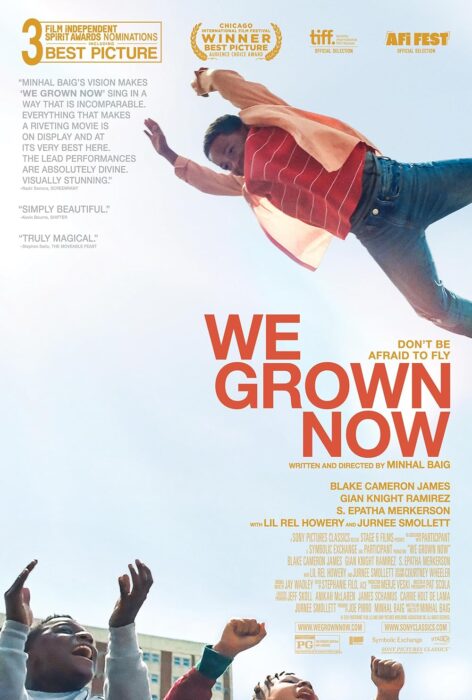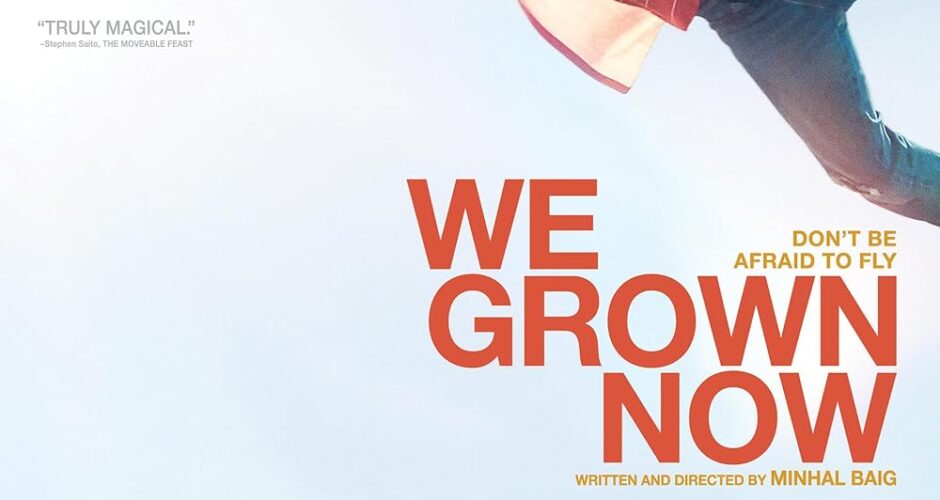
We Grown Now is a small miracle of a film, a coming-of-age drama about 10-year old best friends Malik and Eric, who live in Chicago’s crime-and-drug-infested Cabrini Green housing project. The year is 1992. Occupants of the low-income development are predominantly African-American, many of whom fled the segregated South for what they hoped would be less bigotry and better opportunities. The hard-working, law-abiding residents soon find themselves victimized not only by criminal gangs and drug-lords but also by the notoriously racist, white Chicago police force.
For Malik (Blake Cameron James) and Eric (Gian Knight Ramirez), however, life is an adventure, filled with endless possibilities. They stack abandoned mattresses on the concrete playground, then take a running leap and fly through the air, their landings cushioned by the soft padding. Brimming with optimism and self-confidence, they gaze out at the city beyond the projects and shout, “I exist!” Occasionally they play hooky from school to ride the Elevated train down to the Art Institute of Chicago, where paintings open them up to unimagined new worlds.
Malik lives with his mother Delores (Jurnee Smollett), his grandmother (S. Epatha Merkerson) and his younger sister. Eric lives with his older sister and their widowed father. Malik, an imaginative kid with a gift for writing, dreams of living in a two-story house with a garden where he can grow tomatoes. Eric hasn’t figured out his dream yet, but both boys feel they have all the time in the world. Of course, they don’t.
When seven-year-old Dantrell Davis is killed — caught in the crossfire between rival gangs (a true incident that writer/director Minhal Baig incorporates into the script) — life in the projects changes dramatically. Once free to run around, Malik and Eric are no longer allowed to leave their apartments except to attend school. “Tomorrow is not promised,” Delores tells her son. Trying to find a safer environment for her family, Delores accepts a job that necessitates their move to Peoria, three hours outside Chicago. Feeling abandoned, Eric turns on Malik; it is the first crack in their lifelong friendship. Both boys assumed they would live their entire lives in Cabrini-Green because, as Eric declares, “this is where we are from.” But Malik has to adjust his thinking. “A place is the people,” he decides, and in that regard, he and Eric will remain bound together forever. Without losing his indomitable spirit, Malik seems to mature in front of our eyes.
We Grown Now is the most emotionally rewarding film I have seen in many years. Baig invests it with a lyrical quality; the viewer doesn’t so much observe the story as see it through Malik’s eyes, which lends the film both a vivaciousness and a poignancy that makes one smile even as it is breaking your heart. These boys – these families – were born into a world stacked against them. It is one of the United States’ most painful legacies.
Nobody in the film seems to be acting. Every performance feels so natural and lived-in that the movie could be mistaken for a documentary. With so many fine performances, it seems somewhat unfair to signal out one over the others, but Blake Cameron Jones has an innate truthfulness and charisma that provides an emotional foundation for the entire film.
